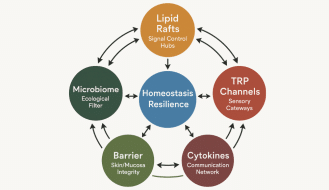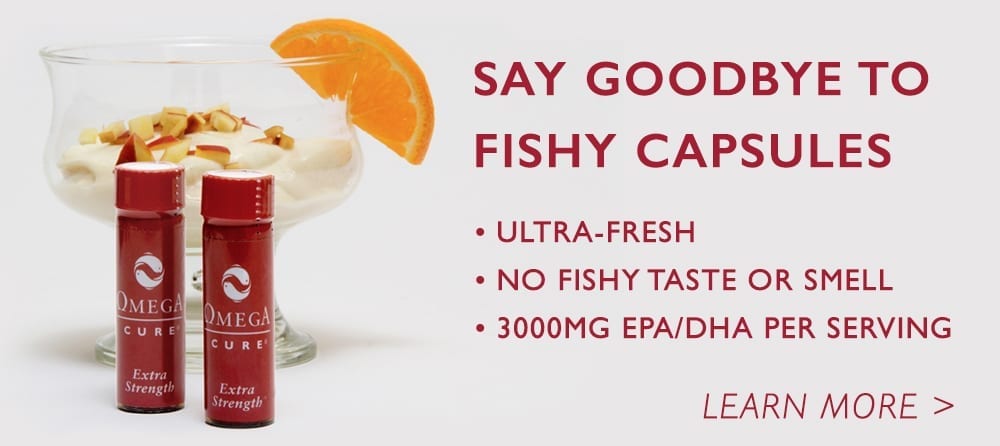7 Reasons Why the Omega-3 Industry Is on the Wrong Track
Having worked with omega-3 fish oil as both a physician and a businessman for the past 16 years, I’ve seen the omega-3 industry evolve. In just the last decade, omega-3 has gone from being a little-known supplement mostly consumed in the Scandinavian countries, to a worldwide, multi-billion dollar industry.
I firmly believe that the increased consumption of fresh omega-3 fatty acids has the potential to improve the health of millions. But I see a disturbing industry trend: the rapid shift towards highly processed and heavily concentrated omega-3 capsules at the expense of natural, fresh fish oil.
Why should we be concerned about the concentrated, “pharmaceutical grade” omega-3s that are flooding the market, and how do they compare to natural, high quality fish oils? Concentrated omega-3s fall short by a number of different standards:
How Concentrated Omega-3s Compare:
1. Concentrated omega-3s are chemically modified.
In order to make concentrated omega-3 supplements, manufacturers have to chemically alter the EPA and DHA omega-3 molecules. Through heavy processing, the EPA and DHA transform into new chemical structures known as ethyl esters. The ethyl esters do not exist in the human body or in nature.
Whenever we are dealing with new chemical structures and substances, we should be skeptical. Since the body has evolved to process fatty acids in a particular way, it will respond differently to chemically modified EPA and DHA molecules than it will to the fatty acids found in natural fish oils. The problem is, we don’t have enough information about how the body will respond to long term consumption of artificial oils. At this time, it is worth noting that pregnant women and children are recommended against using ethyl ester products for safety concerns.
2. There are fewer fatty acids in concentrated omega-3s.
Fresh fish and cod liver oil contain more than 50 different fatty acids plus metabolites, all of which work together and have specific metabolic effects.
Highly concentrated omega-3 fish oils feature only two kinds of fatty acids: EPA and DHA. While the majority of omega-3 research has focused on EPA and DHA from fish oil, we don’t know how these fatty acids work in isolation. Medical studies on various vitamins suggest that taking a vitamin supplement often provides fewer health benefits than consuming a food rich in the vitamin. Researchers speculate that one reason for the discrepancy may be the body responds better to the synergistic effects of the vitamins found in food than it does to a vitamin acting in isolation in pill form.
In the same way, when omega-3 manufacturers produce products containing just one or two omega-3 fatty acids, they are destroying the natural balance found in fish oil without really knowing how that will ultimately compare to eating fish or taking natural fish oil.

3. Concentrated fish oils have been stripped of naturally occurring vitamins.
Natural fish oils, like cod liver oil, are rich sources for vitamin A and D, in addition to omega-3. But the process of concentrating omega-3 destroys the naturally occurring vitamin A and D content of the fish oil. Consumers taking concentrated omega-3s thus miss out on the positive health benefits of the vitamins found in natural fish oils.
4. Concentrated products are more likely to contain rancid fish oil.
In their natural state, the fragile omega-3 molecules are somewhat protected from oxidation by vitamins and a delicate balance of other occurring fatty acids. Concentrated omega-3s, however, undergo hefty processing that destroys the oils’ natural protection system. In order to combat the rancidity problem, manufacturers have to add new antioxidants to the oil. Even so, the concentrated oil is more reactive to oxygen than natural oil. And as a result, concentrated omega-3 products are more likely to contain rancid oil.
5. Concentrated omega-3s are environmentally problematic.
The process of refining natural fish oil into concentrated versions poses environmental concerns. Consider, for instance, that for every gram of pure EPA/DHA created, 60 percent of the oil goes to waste.
People can easily get the same amount of EPA/DHA found in concentrates by increasing their daily dose of fish oil. So, the question remains: what’s the purpose of misusing fish oil and energy resources in order to make concentrated supplements?
6. Concentrated omega-3s are less cost-effective.
When you compare the dose of different omega-3 supplements, concentrated prescription omega-3s are less cost effective than natural sources*. Physicians recommend taking close to 3500 mg of EPA and DHA to lower blood lipids. Those 3500 mg of EPA and DHA can be found in a typical eight-ounce salmon dinner serving, a large tablespoon of cod liver oil, or four prescription omega-3 pills. Concentrated prescription omega-3s come out as the priciest option:
– Half pound serving of wild salmon filet costs around $ 5.50
– One tablespoon fresh Omega Cure cod liver oil costs around $ 2.00
– Four capsules Lovaza prescription omega-3 costs around $ 6.00
*Prices will vary depending on distributor, season, and other considerations.
7. Concentrated omega-3s provide no added purity benefits.
Prescription omega-3s often play up the fact that they do not contain heavy metals and pesticides. But neither do high quality natural fish oils from reputable manufacturers.
We Don’t Need Omega-3 Concentrates
Fish oil brands producing omega-3 concentrates argue that their products contain more EPA and DHA per capsule. Since consumers have to take fewer capsules a day to achieve a clinically effective omega-3 dose, they are more likely to comply with the dose regimen and experience health benefits as a result.
The dose concern is certainly valid, especially since few people are willing to consume the handfuls of capsules a day required to lower triglyceride levels and reduce joint pains.
But the argument falls short when we know people can easily get the same dose of EPA and DHA from non-concentrated forms in just a tablespoon of liquid fish oil. Furthermore, a liquid fish oil should be no less palatable than consuming fish oil capsules. If the oil is truly fresh, it should have no fishy taste or smell and should be easy to add into juices and smoothies.
So, if natural liquid fish oils provide as much EPA and DHA as concentrated omega-3 products, why is the industry increasingly leaning towards concentrates as the wave of the future?
Money of course, is a big part of the equation. It is more expensive to invest in high quality, fresh fish oil than concentrated capsules that can be produced relatively cheaply and have an extended shelf-life of many years.
The Alternative to Concentrated Omega-3s:
Physicians and dietitians agree that eating fresh fruits and vegetables is superior to taking a multivitamin every day. That same principle goes for fish oil. Eat fish five to six times a week or use a fresh, natural fish oil in liquid form for the best omega-3 sources. Those two options are less expensive and more likely to improve your health than highly processed, concentrated omega-3 pills.
Popular posts



Related posts







